Amos’ judgment on the surrounding nations
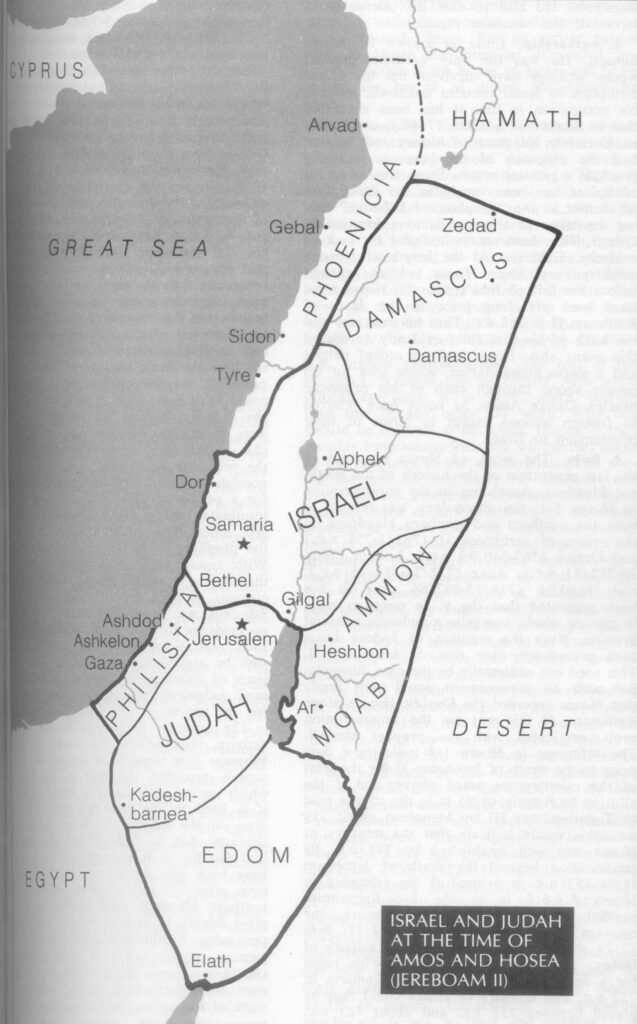
Sequence of the nations addressed
Instruction
Go back to the observation you did on Amos chapter 1 and 2 and notice the sequence of nations addressed. Find the nations on the map and notice how Amos proceeds.
Findings
Amos addresses nations in the following sequence: Aram (Syria), Philistia, Phoenicia > Edom > Ammon > Moab > Judah > Israel. He seems to be addressing nations all around, then zero in on his real target: Israel.
Israel’s past story with these nations
Instruction
Look at the Genealogy chart given on the left and think about how Israel is related to the nations mentioned.
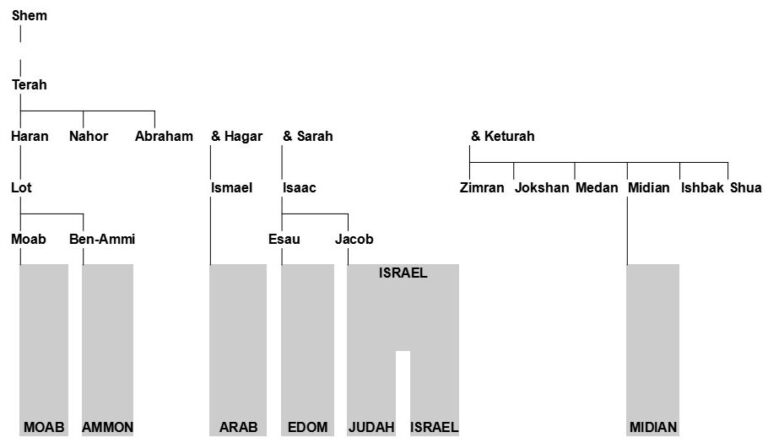
Findings
- The first three nations mentioned, Aram, Philistia and Phoenicia, are not closely related to Israel.
- The next nations mentioned are Abrahamic peoples: Edom comes from Esau and is a brother-nation to Israel. Ammon and Moab come from Lot, the nephew of Abraham. Judah is the sister nation, from which Israel fell away in 931 BC, some 150 years ago.
- Israel had conflicts and all out wars with most of these nations at one time or another.
The sequence of nations
Instruction
Remember that Amos speaks his message in Bethel to ‘religious’ Israelites that have come for some feast. Think about the following questions:
- How would an Israelite feel hearing about God’s impending judgment on these nations, with which Israel has difficult history?
- Can you see any connection to another repeated theme “day of the Lord”, meaning judgment day?
- Amos 5:18 “Woe to you who desire the day of the LORD! Why do you desire the day of the LORD? It is darkness, not light.”
- How would the sequence of nations affect a hearer?
- How would the hearers have felt when the sequence zeroed in (and climaxed) with a judgment on Israel itself?
Findings
- Since Israel had disastrous wars with most of these nations, an announcement of God’s judgment on them would likely have cause Israelites to rejoice at Amos’ declaration.
- A feeling of glee, of finally successful revenge would have dominated.
- They would have interpreted God judging the other nations as the long awaited “day of the LORD”, when God re-established justice and vindicates Israel.
- There would have been and excitement in the room, growing with each nation mentioned.
- People would have agreed, rejoiced, gloated … till Amos announced God’s judgment over Israel itself, zeroing in on the real target.
- It would have shocked everyone, silenced everyone.
- And fuming anger at Amos would have immediately erupted: Who does this guy think he is?
- It seems Amos deliberately traps his hearers in the very deliberate sequence of nations he mentions.
- He is trying to get to their heart.
- He is trying to show them God’s very different perspective on them.
What does God judge nations for?
Though convicting Israel is Amos’ main goal, it is still very important to notice what are the exact reasons for God judging each nation. Amos is using a formula, a repeated phrase: “Thus say the Lord: (authority) … for three transgressions of (name of the nation) and for four, I will not revoke the punishment (the extent of sin) because (reason for judgment) … So I will (judgment) … says the LORD.”
Instruction
Make a list of exactly what each nation is judged for. Try to understand the main sin or bad action that God holds the nation accountable for.
Findings
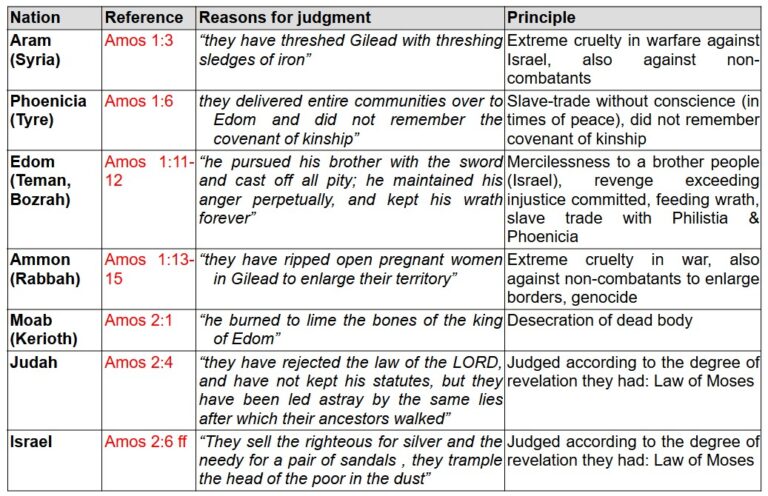
Instruction
Think about these questions:
- What exactly are the other nations judged for?
- Why is there a mention of God’s law for Judah (and Israel)?
Findings
- The other nations are judged for breaking of covenants, selling humans into slavery (in peace time / as business), trafficking, extreme violence in warfare, excess revenge, genocide, desecration, …
- These are all things that all nations would agree that nobody should do.
- They are judged by what could be called commonly agreed on natural law.
- Commonly agreed on natural law means this: If anyone will call another one unjust for a certain behavior, then if he does that same behavior himself, it is counted as sin to him. Or said differently: The standard I judge others by, that standard God judges me by. This is the negative version of the ‘golden rule’ that Jesus declared: “Do to others what you want them to do to you”.
- It is interesting to note that Judah and Israel are held to a sharper standard, the standard of God’s law – a revelation they had, but the other nations did not.
- God’s justice is revealed in this: He doesn’t judge people for what they didn’t know, only for what they did know. This general standard of conscience Paul describes in Rom 1:20 “they have no excuse”.
What is God's relationship with other nations?
Instruction
This brings up another important question: We have some idea as to what God’s relationship with Israel is, but what is his relationship with other nations? All nations?
Think about this question and try to recall any Scripture that talks about God’s relationship with nations in general.
Findings
- Gen 1:28 Humans should fill the earth, implying geographic spread, cultural diversity. God wants nations!
- Gen 10 God brings nations into existence and celebrates that.
- Exo 9:24 God knows the history of each nation
- Deu 2:9-25 God gives land to people, God removes nations from their land.
- Amo 9:7 God calls and moves nations
- Acts 17:26 God defines the borders and times of nations. He has agreements with nation.
- Lev 18:1-3 God holds nations accountable.
- Gen 15:16 God measures the sin of nations, only removes them if they have become
unredeemable. - Lev 18:24-31 Extreme sin will result in the nation losing the right over that land.
- Many God judges nations
- Many, Hab 1 God uses nations to judge nations
- It is important to understand what the relationship of God dealing with all nations and the calling of Israel is.
- God called Abraham because through him God wanted all nations to be blessed (Gen 12:3).
- When Israel calls Israel as a nation (Exo 19:4-6) he tells them to (as a nation) become a priestly kingdom.
- Priests are mediators between God and others.
- So Israel as a nation was meant to be a mediator between God and the nations.
- Israel’s calling was not to be “special”.
- Israel was meant to be an attractive model nation that would teach the other nations about God (Deu 4:5-6).
- Israel was meant to show what God was willing to do for any nation. And in the New Testament we see this become a reality: salvation and redemption is for all nations.
- This nations-theme in Amos would humble Israel because they think themselves on a different level.
- It also prepares the ground for Amos’ actual message to his hearers: Israel has sinned, it has ceased to be godly or different from other nations.
- Therefore God is pronouncing impending judgment and a stern call to repent.
International Law
Let’s look one more time at what exactly God judges the nations for: breaking of covenants, selling humans into slavery (in peace time / as business), trafficking, extreme violence in warfare, excess revenge, genocide, desecration of a dead body.
Instruction
Can you think of how these points could be important for the relationships between nations even today?
Teaching
- Passages like Amos 1-2 and also Deuteronomy 19-21 have been studied for principles governing the relationship between nations.
- Henri Dunant (the founder of the Red Cross) expressed precisely principles like this in his work.
- Out of his efforts resulted the Geneva Convention, a document that most nations have signed voluntarily.
- The Geneva convention addresses issues like rights of prisoners of war, prohibition of selling or mistreating prisoners of war, prohibition of desecration, distinguishing between soldiers and non-combatants etc.
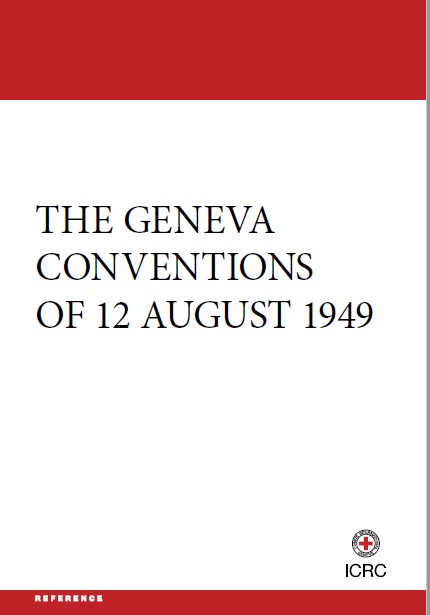
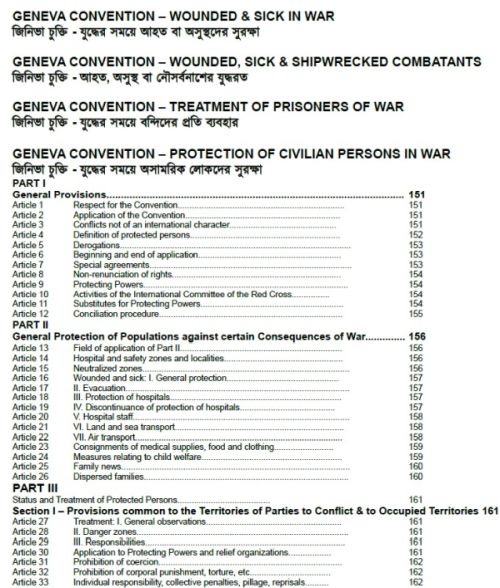
Repeated theme: Hymns in Amos
Instruction
One repeated theme we observed the prophecy of Amos was the descriptions of God’s character that are sprinkled throughout the text. Read Amos again and make a list of these passages. What do they reveal about God? Why is this important?
Read these passages (or hymns) carefully and list how God is described in them. What purpose do these beautiful passages serve? How do they connect with the other themes in Amos, like the mistreatment of the poor or the false religiosity?
Example
- Amos 1:2 “the LORD roars from Zion, and utters his voice in Jerusalem; the pastures of the shepherds wither, and the top of Carmel dries up”
Findings
- Amos 1:2 “the LORD roars from Zion, and utters his voice in Jerusalem; the pastures of the shepherds wither, and the top of Carmel dries up.”
- Amos 4:13 “For lo, the one who forms the mountains, creates the wind, reveals his thoughts to mortals, makes the morning darkness, and treads on the heights of the earth – the LORD, the God of hosts, is his name!”
- Amos 5:8-9 “The one who made the Pleiades and Orion, and turns deep darkness into morning, and darkens the day into night, who calls for the waters of the sea, and pours them out on the surface of the earth, the LORD is his name, who makes destruction flash out against the strong, so that destruction comes upon the fortress.”
- Amos 9:5-6 “The Lord, GOD of hosts, he who touches the earth and it melts, and all who live in it mourn, and all of it rises like the Nile, and sinks again, like the Nile of Egypt; who builds his upper chambers in the heavens, and founds his vault upon the earth; who calls for the waters of the sea, and pours them out upon the surface of the earth – the LORD is his name.”
God is described as powerful, sovereign, Creator, sustainer of the universe, the one who knows everything and intervenes in this earth. God watches, judges if need be and nobody can prevent him from doing so.
Trough these passages Amos reminds Israel of who God truly is. Their false religiosity can only bloom on wrong concepts of God. They think God doesn’t see. They think God doesn’t care. They think that God can be bribed with religious observance and sacrifices. They think their displays of religiosity impress God. Or they think they can get away with injustice. Amos shatters all of that through these descriptions of who God really is.
Repeated Theme in Amos: Social injustice
Instruction
Re-read the verses given below where Amos accuses Israel of careless injustice to the poor. Think about the importance of these passages.
Example
Amos 2:6ff “because they sell the righteous for silver, and the needy for a pair of sandals – they who trample the head of the poor into the dust of the earth, and push the afflicted out of the way.”
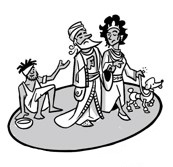
Findings
- Amos 2:6 “because they sell the righteous for silver, and the needy for a pair of sandals – they who trample the head of the poor into the dust of the earth, and push the afflicted out of the way.”
- Amos 2:8 “and in the house of their God they drink wine bought with fines they imposed.”
- Amos 3:9-11 “Assemble yourselves on Mount Samaria, and see what great tumults are within it, and what oppressions are in its midst. They do not know how to do right, says the LORD, those who store up violence and robbery in their strongholds.”
- Amos 4:1 “Hear this word, you cows of Bashan who are on Mount Samaria, who oppress the poor, who crush the needy, who say to their husbands, bring something to drink! …
- Amos 5:10-12 “They hate the one who reproves in the gate, and they abhor the one who speaks the truth. Therefore because you trample on the poor and take from them levies of grain, you have built houses of hewn stone, but you shall not live in them … For I know how many are your transgressions, and how great are your sins – you who afflict the righteous, who take a bribe, and push aside the needy in the gate.”
- Amos 5:23-24 “Take away from me the noise of your songs; I will not listen to the melody of your harps. But let justice roll down like waters, and righteousness like an ever-flowing stream.”
- Amos 6:1 “Alas for those who are at ease in Zion, and for those who feel secure on Mount Samaria.”
- Amos 6:4-6 “Alas for those who lie on beds of ivory, and lounge on their couches, and eat lambs from the flock, and calves from the stall; who sing idle songs to the sound of the harp … who drink wine from bowls and anoint themselves with the finest oils, but are not grieved over the ruin of Joseph!”
- Amos 8:4-6 “Hear this, you that trample on the needy, and bring to ruin the poor of the land, saying, When will the new moon be over so that we may sell grain and the sabbath, so that we may offer wheat for sale? We will make the ephah small and the shekel great, and practice deceit with false balances, buying the poor for silver and the needy for a pair of sandals, and selling the sweepings of the wheat.”
Thoughts to consider
- Amos is very specific, emotional, involved, powerful and convicting in denouncing social injustice. Note that he is not denouncing “being rich” as such.
- Also the Law of Moses did not denounce being rich.
- Amos is not speaking from jealousy, nor self-pity of the less fortunate. Amos’ very own prophesy at the end of the book describes God’s material blessing on the remnant of Israel (Amos 9:11-15).
- Economic well-being is part of God’s blessing in the Law of Moses as well.
- What Amos denounces is prosperity of some people against the poverty of the majority.
- He denounces injustice, unrighteous gain, the twisting of laws, the mercilessness and the couldn’t-care-less attitude, the luxury and excess in the face of abject poverty, the having the power to do something and not doing it.
- On top of all this sin, Israel is self-assured, self-righteously pursuing religious duties and considering itself blessed and favored by God.
- Self-righteous religiosity while oppressing the vulnerable, that is like spitting into the face of the poor – and spitting into the face of God … which is the same, as Jesus tells us.
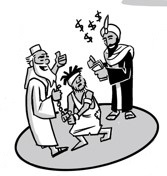
Amos is not alone with this focus on social injustice, many of the prophets similarly denounce the social injustice of Israel. This message is at the very heart of God and therefore to be found all throughout the Bible. Some examples:
- Ezekiel 16:49 “Sodom” here means Israel, having “pride, excess of food, and prosperous ease, but did not aid the poor and needy.”
- Isaiah 5:8 speaks of a similar development in Judah some 25 years later: “Ah, you who join house to house, who add field to field, until there is room for no one gut your, and you are left to live alone in the midst of the land.”
- In Micah we find another vivid description in 3:1-3 “Listen, you heads of Jacob and rulers of the house of Israel! Should you not know justice? – you who hate the food and love the evil, who tear the skin off my people, and the flesh off their bones; who eat the flesh of my people, flay their skin off them, break their bones in pieces, and chop them up like meat in a kettle, like flesh in a cauldron.”
- Also in Matthew 25 Jesus tells the parable of the sheep and the goats, where the decisive evidence for being godly is the way one treats the poor, the sick, the needy, the prisoners ..
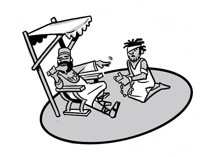
- Amos is not exactly commanding to ‘help the poor’ in the sense of giving money or providing otherwise.
- But at the very minimum the hindrances must be removed: no injustice against the poor, no cheating, no inverting of judgment, no unjust gain, no keeping them down, no frustration of their labor.
- Amos drives home that there cannot any pleasing of God unless the “least of these” are treated well. God measures a society by how it treats the poor and vulnerable.
- No self-congratulating religiosity and at the same time oppression of the weak.
- Or to say the same thing with New Testament words: To love God is to love the neighbor. Whoever doesn’t love the neighbor does not love God, whatever he or she may claim.
- The spiritual and the physical cannot be separated.
- The religious and the practical cannot be separated.
- Godliness must translate into service to the poor.
- Jesus says that if a neighbor has anything against us, we should leave our sacrifice at the altar and first make that right (Mth 5:23-24).
- To separate what God put together means to fool oneself: empty religiosity or self-congratulating morality.
- God is not fooled. You only fool yourself.